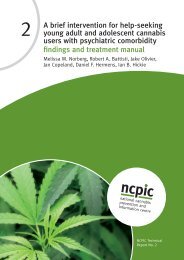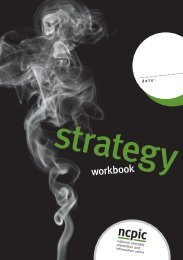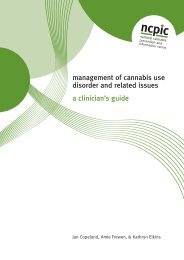GP guidelines for the assessment and management of cannabis use ...
GP guidelines for the assessment and management of cannabis use ...
GP guidelines for the assessment and management of cannabis use ...
Create successful ePaper yourself
Turn your PDF publications into a flip-book with our unique Google optimized e-Paper software.
factsheet<strong>GP</strong> <strong>guidelines</strong> <strong>for</strong> <strong>the</strong><strong>assessment</strong> <strong>and</strong> <strong>management</strong>1<strong>of</strong> <strong>cannabis</strong> <strong>use</strong> disorderidentifying <strong>cannabis</strong> <strong>use</strong>rsWhile <strong>cannabis</strong> is <strong>the</strong> most commonly <strong>use</strong>d illicit drug, few patients will present directlyrequesting assistance in managing <strong>the</strong>ir <strong>cannabis</strong> <strong>use</strong> or related conditions. Research hasshown that <strong>cannabis</strong> <strong>use</strong>rs recognize <strong>and</strong> support <strong>the</strong> role <strong>of</strong> <strong>GP</strong>s in <strong>the</strong> active, opportunistic<strong>assessment</strong> <strong>and</strong> <strong>management</strong> <strong>of</strong> <strong>the</strong>ir <strong>cannabis</strong> <strong>use</strong>.For this reason, it is important to identify high-risk groups <strong>for</strong> brief <strong>assessment</strong> <strong>and</strong> advice.<strong>the</strong> groups at higher risk <strong>of</strong> having <strong>cannabis</strong> <strong>use</strong> disorderinclude:• those aged under 40 years• males• tobacco smokers• patients with mental health conditions• patients presenting with chronic respiratory tract symptoms/infections noto<strong>the</strong>rwise explained including chest painThe flow chart on page 2 sets out <strong>the</strong> steps in <strong>the</strong> <strong>assessment</strong> <strong>and</strong> brief <strong>management</strong> <strong>of</strong><strong>cannabis</strong>-related problems. The Severity <strong>of</strong> Dependence Scale (SDS) follows it, along withscoring <strong>and</strong> suggested feedback.As few patients come to <strong>the</strong> surgery thinking about changing <strong>the</strong>ir <strong>cannabis</strong> <strong>use</strong>, <strong>the</strong>ymay require some time to take in <strong>the</strong> in<strong>for</strong>mation <strong>and</strong> make a commitment to change. Besupportive <strong>of</strong> this process <strong>and</strong> encourage <strong>the</strong>m to return when <strong>the</strong>y are ready to explore withyou making changes in <strong>the</strong>ir <strong>cannabis</strong> <strong>use</strong>. They may only be ready to cut down at first butany change is positive <strong>and</strong> supports fur<strong>the</strong>r reduction.Where you suspect <strong>cannabis</strong> <strong>use</strong> may be indicated:• ask <strong>the</strong> patient about <strong>the</strong> frequency <strong>of</strong> <strong>the</strong>ir <strong>cannabis</strong> <strong>use</strong>• if <strong>the</strong>y are less than 18 years <strong>the</strong>y are at elevated risk <strong>of</strong> poorer educational<strong>and</strong> mental health outcomes at even low levels <strong>of</strong> <strong>use</strong>, so provide <strong>the</strong>m with<strong>the</strong> Adolescent Risks Factsheet, advise <strong>the</strong>m to quit <strong>and</strong> refer to <strong>the</strong> CannabisIn<strong>for</strong>mation <strong>and</strong> Helpline 1800 30 40 50, or if <strong>the</strong>y ask <strong>for</strong> specialist care, to ADISif you aren’t aware <strong>of</strong> appropriate local services. Arrange a follow-up appointmentto re-assess• if your patient is using <strong>cannabis</strong> more than weekly <strong>and</strong> is willing to answer fur<strong>the</strong>rquestions, proceed to <strong>the</strong> 5 item SDS. Feedback <strong>the</strong> score <strong>and</strong> advise <strong>the</strong>mthat a score <strong>of</strong> 3 or more indicates <strong>the</strong>y are dependent on <strong>cannabis</strong>. Words aresuggested <strong>for</strong> eliciting <strong>the</strong>ir feelings about this in<strong>for</strong>mation• assess <strong>the</strong>ir willingness to explore making changes in <strong>the</strong>ir <strong>cannabis</strong> <strong>use</strong>• follow flow chart’s suggested advice, relevant factsheets, 1800 30 40 50 <strong>and</strong>o<strong>the</strong>r referrals <strong>and</strong> follow-up1
<strong>GP</strong> <strong>guidelines</strong> <strong>for</strong> <strong>the</strong> <strong>assessment</strong> <strong>and</strong> <strong>management</strong> <strong>of</strong> <strong>cannabis</strong> <strong>use</strong> disorder factsheet 1Assess number <strong>of</strong> days <strong>of</strong> <strong>cannabis</strong> <strong>use</strong> in past month1factsheetIf < 18 years, any <strong>use</strong> is risky:• give Factsheet 2• advise to quit• make follow-upappointment <strong>for</strong> 1 monthIf > 18 years <strong>and</strong> > weekly <strong>use</strong>:• assess dependence (SDS)• give feedback from SDS• assess readiness tochangeIf > 18 years <strong>and</strong>< weekly <strong>use</strong>:• give Factsheet 3If willing to explore changes in <strong>the</strong>ir<strong>cannabis</strong> <strong>use</strong>:• advise <strong>of</strong> options about cutting down orquitting• provide Factsheets 4 <strong>and</strong> 5• <strong>of</strong>fer Cannabis In<strong>for</strong>mation <strong>and</strong> Helpline:1800 30 40 50• monitor at subsequent appointmentsIf not willing to explore changes in <strong>the</strong>ir<strong>cannabis</strong> <strong>use</strong>:• raise concerns• educate on risks <strong>and</strong> provide Factsheet 3• be open to discussion• make aware <strong>of</strong> Cannabis In<strong>for</strong>mation <strong>and</strong>Helpline: 1800 30 40 50• monitor at subsequent appointmentsseverity <strong>of</strong> dependence scale (SDS)These are <strong>the</strong> questions that make up <strong>the</strong> Severity <strong>of</strong> Dependence Scale.Tick <strong>the</strong> patient’s response <strong>and</strong> add up <strong>the</strong> score out <strong>of</strong> 15.In <strong>the</strong> last month:1 Did you ever think your <strong>use</strong> <strong>of</strong><strong>cannabis</strong> was out <strong>of</strong> control?Never or almost never 0Sometimes 1Often 2Always or nearly always 32 Did <strong>the</strong> prospect <strong>of</strong> missing a smokemake you very anxious or worried?Never or almost never 0Sometimes 1Often 2Always or nearly always 33 Did you worry about your <strong>use</strong> <strong>of</strong><strong>cannabis</strong>?Not at all 0A little 1Quite a lot 2A great deal 34 Did you wish you could stop?Never or almost never 0Sometimes 1Often 2Always or nearly always 35 How difficult would you findit to stop or go without?Not difficult 0Quite difficult 1Very difficult 2Impossible 3SDS Score Dependence rating0-3 nil or negligible4-6 mild7-9 moderate10-12 substantial13-15 severesds score /15, indicating a level <strong>of</strong> dependence2
<strong>GP</strong> Guidelines <strong>for</strong> <strong>the</strong> <strong>assessment</strong> <strong>and</strong> <strong>management</strong> <strong>of</strong> <strong>cannabis</strong> <strong>use</strong> disorder factsheet 1Feedback from SDS:e.g. 13/15“what do you think that means where a score <strong>of</strong> 3 or more indicates<strong>cannabis</strong> dependence?”1factsheetSuggested questions in assessing readiness to change include:“would you like to talk more about your <strong>cannabis</strong> <strong>use</strong>?”“would you like some assistance to manage your <strong>cannabis</strong> <strong>use</strong>?”when to refer• severe dependence (12+)• severe psychiatric comorbidity• risk <strong>of</strong> harm to self or o<strong>the</strong>rs• significant polydrug <strong>use</strong>• patient’s desire <strong>for</strong> specialist treatment• history <strong>of</strong> failed <strong>GP</strong> <strong>management</strong>in summary:The important steps are:• to assess frequency <strong>of</strong> <strong>cannabis</strong> <strong>use</strong>• if more than weekly, assess dependence• feedback to <strong>the</strong> patient <strong>the</strong>ir levels <strong>of</strong> <strong>use</strong>, dependence status <strong>and</strong> anyo<strong>the</strong>r concerns <strong>the</strong>y may raise during <strong>the</strong> consultation e.g. “you tell me youare using <strong>cannabis</strong> most days <strong>of</strong> <strong>the</strong> week”, “your score indicates you aremoderately dependent on <strong>cannabis</strong>”, “you’ve told me that you are sick <strong>of</strong>your partner nagging you about smoking <strong>and</strong> you’ve always got this cough”• be positive, non-judgemental <strong>and</strong> support <strong>the</strong> patient’s capacity to change<strong>the</strong>ir <strong>cannabis</strong> <strong>use</strong>• explore willingness to make those changes• provide appropriate in<strong>for</strong>mation sheets which contain NCPIC web address<strong>for</strong> fur<strong>the</strong>r resources <strong>and</strong> <strong>the</strong> free national 1800 30 40 50 CannabisIn<strong>for</strong>mation <strong>and</strong> Helpline if <strong>the</strong>y have any questions• refer to o<strong>the</strong>r services as required e.g. local ADIS <strong>for</strong> specialist referral• monitor <strong>and</strong> follow-up at subsequent visitsFor more help or in<strong>for</strong>mation please visit <strong>the</strong> National Cannabis Prevention<strong>and</strong> In<strong>for</strong>mation Centre website at: www.ncpic.org.au or call <strong>the</strong> CannabisIn<strong>for</strong>mation <strong>and</strong> Helpline on 1800 30 40 503










